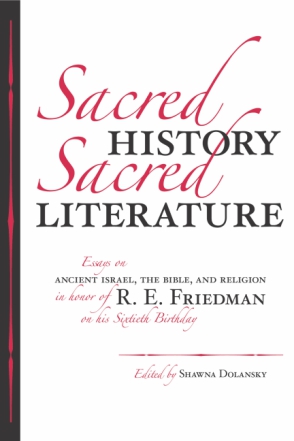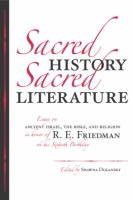
Sacred History, Sacred Literature
Essays on Ancient Israel, the Bible, and Religion in Honor of R. E. Friedman on His Sixtieth Birthday
Edited by Shawna Dolansky
Sacred History, Sacred Literature
Essays on Ancient Israel, the Bible, and Religion in Honor of R. E. Friedman on His Sixtieth Birthday
Edited by Shawna Dolansky
Richard Friedman is well known in the field of biblical studies, not only because of his contributions to the study of the Hebrew Bible (which are many) but also because he has written cogently and clearly for a much wider audience, outside the academy, most notably in his Who Wrote the Bible? (1997). In addition, his influence has crossed the boundaries of a variety of disciplines such as source criticism, archaeology, the ancient Near East, as well as religious studies.
- Description
- Table of Contents
The essays in this volume reflect the breadth and depth of Richard Friedman’s life and work. Several contributors discuss topics related to the Hebrew Bible: for example, Jacob Milgrom examines the relationship between Ezekiel and the Levites and Carol Meyers discusses the Tabernacle texts in the context of Priestly influence on them; Ronald Hendel, Michael Homan, and Robert Wilson explore the history of source criticism, with detailed source-critical analysis of Genesis 1–11 and the book of Kings. Jeffrey Geoghegan discusses the origins of the Passover in one of several insightful essays under the topic “Israel and the Ancient Near East.” Among the contributions specific to archaeology, Baruch Halpern’s provides a provocative “Defense of Forgery.” Lastly, four contributors (e.g., Alan Cooper) discuss religion and religious studies, along with ramifications for contemporary application. A fine collection of contemporary topics discussed by leading scholars in the field.
Richard Elliott Friedman: An Appreciation William H. C. Propp
Introduction Shawna Dolansky
The Hebrew Bible
Ezekiel and the Levites Jacob Milgrom
Framing Aaron: Incense Altar and Lamp Oil In the Tabernacle Texts Carol Meyers
Necromancy and 1 Samuel 19:22 W. Randall Garr
A Tale of the Prophet and the Courtier: A Responsive Reading of the Nathan Texts Herbert Huffmon
A Forgotten Cultic Reform? 2 Kings 3:2b André Lemaire
Scribal Error and the Transmission of 2 Kings 18-20 and Isaiah 36-39 Bradley Root
Empirical Taxonomy and the Hebrew Bible A. Dean Forbes
Place Names as Superlatives in Classical Hebrew H. G. M. Williamson
Source Criticism
Leitwort Style and Literary Structure in the J Primeval Narrative Ronald Hendel
How Moses Gained and Lost the Reputation of Being the Torah’s Author: Higher Criticism Prior to Julius Wellhausen Michael M. Homan
How Was the Bible Written? Reflections on Sources and Authors in the Book of Kings Robert Wilson
Israel and the Ancient Near East
The “Biblical” Origins of Passover Jeffrey C. Geoghegan
“Plowing With a Heifer” – Tracing a Sexual Euphemism Shalom M. Paul
Aramean Skin Care: A New Perspective on Naaman’s Leprosy Laura Zucconi
Abraham and Damascus in Some Greek and Latin Texts of the Hellenistic Period John A. Emerton
Rethinking Sectarian Judaism: The Centrality of the Priesthood in the Second Temple Period Risa Levitt Kohn and Rebecca Moore
The Bible and Archaeology
In Defense of Forgery Baruch Halpern
Can Archaeology Serve as a Tool in Textual Criticism of the Hebrew Bible? William G. Dever
“You Shall Make for Yourself No Molten Gods”: Some Thoughts on Archaeology and Edomite Ethnic Identity Thomas E. Levy
Female Infanticide in Iron II Israel and Judah Beth Alpert Nakhai
Religion and Religious Studies
Elements of Popular Piety in Late Medieval and Early Modern Jewish Psalms Commentary Alan Cooper
The Biblical Icon Stephen D. Cox
Walter Rauschenbusch, the Social Gospel Movement And How Julius Wellhausen Unwittingly Helped Create American Progressivism in the Twentieth Century Steven Cassedy
Starving the Patient: A Jewish Perspective on Terry Schiavo and the Feeding Tube Controversy Randy Sturman
Mailing List
Subscribe to our mailing list and be notified about new titles, journals and catalogs.



